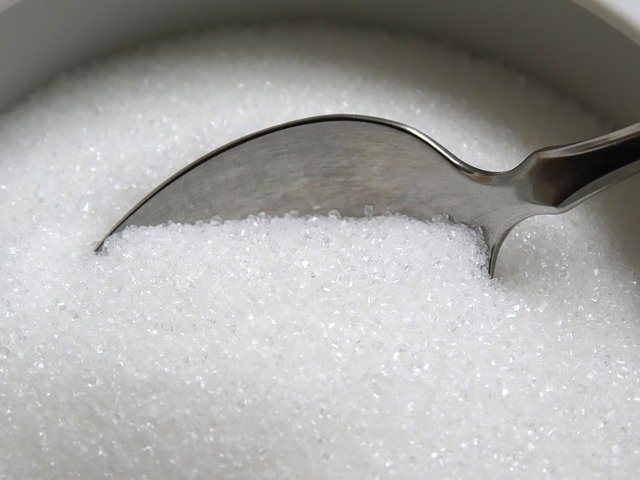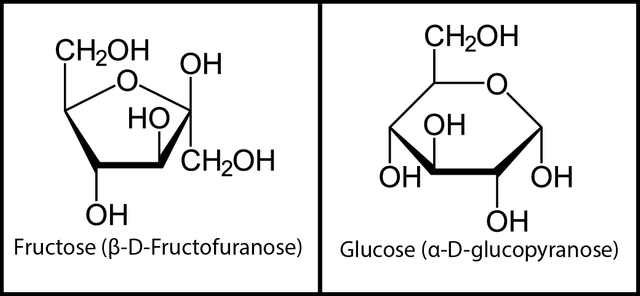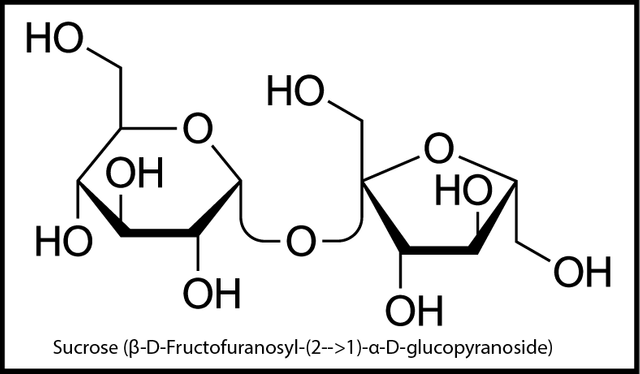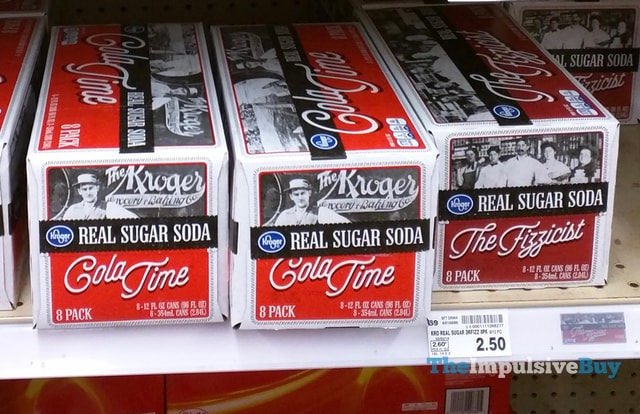The Type of Sugar, In Addition to Amount Consumed Determines Negative Health Outcomes
Did you know that the average American consumes around 94 grams of sugar per day (Source)? That's equivalent to around 400 calories!

I should hope over the past few years we have all gotten the message about the large number of health concerns associated with a high intake of simple sugars (table sugar is a simple sugar, while carbohydrates from say...rice, are a complex sugar!). The issues of excess sugar consumption are far reaching and include contributing to the development of Diabetes, Heart Disease, Cancer, and even Modified Brain Reward Center Activity (similar to those found in addicts).

So a goal of reducing overall sugar intake has been reccomended by many health organizations including: The WHO, The American Heart Association and The American Cancer Society, you know groups concerned about the chronic diseases that high sugar consumption can cause. I doubt there are any surprises here.
What might be of interest to you ( though may be common sense to some ) is that not all simple sugars are the same with regards to their effects on the body. In an article published in December of 2016 in the American Journal of Physiology titled "Type of Supplemented Simple Sugar, Not Merely Calorie Intake, Determines Adverse Effects on Metabolism and Aortic Function in Female Rats." The authors did some interesting experiments looking at the effects of both glucose and fructose consumption on various aspects of metabolism in rats.
Fructose Vs. Glucose... Sucrose (table sugar) Vs. High Fructose Corn Syrup
Before we dive into the article lets take a brief moment to look at the sugar sources tested in the article, as well as comparing two prominent dietary sugar sources.
Fructose Vs. Glucose
We begin with the two sugar molecules, fructose (plant sugar) and glucose (animal blood sugar). Below I have put their chemical structures:

You can see that these two sugars look pretty similar, they are both ring shaped molecules with fructose having a ring composed of 4 connected carbons, while glucose has a ring with 5 connected carbons. These two sugars exist on their own, and are termed monosaccharides (mono means one, and saccharide means sugar!) and as a result are easy for the body to process quickly. It is for this reason that we call them "simple sugars" as their is very little processing required before they can be involved in metabolic processes. In animals glucose circulates in our blood in the monosaccharide form, however for plants, fructose is usually exists in the form of a disaccharide (di meaning two sacharide meaning sugar) and is bound to a glucose monomer. We know that fructose-glucose disaccharide quite well, its called sucrose (table sugar).
Sucrose Vs. High Fructose Corn Syrup

The image above is of sucrose, if you compare the shapes with in it to the structures I showed you before you should be able to see that there is a glucose unit (on the left) covalently bound to a fructose unit (on the right). So I am sure you are well aware of all of the marketing that companies present to you about how they are removing high fructose corn syrup from products and replacing it with "REAL SUGAR."

However have you ever wondered what the difference is between the two?
High fructose corn syrup (HFCS) is produced by reacting corn starch ( a very long chain of predominantly glucose molecules linked together in series) with the enzyme glucose isomerase which reacts with two glucose molecules and releases a glucose molecule and a fructose molecule. Reaction of the corn starch with the glucose isomerase converts some of the glucoses in the chains to fructoses. The goal was to create a solution that had a fructose concentration that was similar to that of sucrose (which is 1:1, or 50%). There are two main varieties of HFCS one which is 42% fructose (HFCS - 42) and one which is 55% fructose (HFCS - 55). (Source)
So You're Telling Me, High Fructose Corn Syrup Isn't Really High In Fructose?
Yes, that's what I am telling you. The amount of fructose in HFCS is basically the same as what is present in Sucrose (table sugar). The difference between the two is largely that sucrose is composed of those disaccharides, while HFCS is longer chains of the glucose and fructose units linked together. These longer chains are in part what makes it syrupy.

But Wait... I thought It was Really Bad For You
Oh it is, what I am going to tell you is that the "healthier" sucrose alternative isn't any healthier. Lets get to the article.
The Study
The authors of the study wanted to determine the effects of the consumption of the simple sugars glucose and fructose and the effect that the consumption had on various aspects of metabolism in rats.
What they found was interesting:
Only Fructose Caused Increases in Body and Liver Weight
The authors supplemented the diets of rats with solutions consisting of either 20% glucose or 20% fructose. They tried to keep total caloric intake for the rats similar by limiting the food available for the rats to eat, however in this study the total number of calories consumed for the rats with the glucose solution was about 1.15 times that of those drinking the fructose solution.
However oddly, only the fructose group showed a marked increase in body weight (1.1 times heavier than at the start) at the end of the 8 week study (10% weight gain in only 8 weeks). The glucose group, while consuming MORE calories didn't gain weight. In addition the mass of the liver of the fructose fed rats increased by 1.4 fold over that of control and 1.3 fold over that of the glucose fed rats!
Consumption of fructose specifically resulted in fatter rats, with significantly fattier livers. Glucose did increase fat generation in the animals livers, but not to the extent of fructose.
Both Sugars Result In Increased Insulin Resistance In The Liver and Blood Vessels
The supplementation of both sugars resulted in a weakened effectiveness of insulin in both the liver and aorta of these rats, however as was the case for fat formation, fructose resulted in a much greater detrimental effect then did glucose.
Conclusions
Dietary supplementation with liquid glucose or fructose results in metabolic and vascular changes in rats. The changes observed for rats fed fructose were worse then those observed in those fed glucose.
Take Away
Not all simple sugars are created equally and it would appear that the consumption of fructose has a significantly greater possibility for negative effects. We are presented with the idea that eliminating High Fructose Corn Syrup from our diets, and instead supplementing sucrose is a more healthy option.
The fructose composition in either of these two sugar sources is relatively comparable, thus neither is a better option for consumption.
The only healthy move is to keep sugar consumption to as low as possible. You're an adult and nobody can tell you how to eat, however the science is stacking up that over consumption of sugars has a detrimental effect on the body. This new research indicates that over consumption of fructose has a higher potential for harmful effects then glucose.
Sources
- http://journals.plos.org/plosone/article?id=10.1371/journal.pone.0057873
- http://jamanetwork.com/journals/jamainternalmedicine/article-abstract/2548255
- http://journals.plos.org/plosone/article?id=10.1371/journal.pone.0161228
- http://journals.plos.org/plosone/article?id=10.1371/journal.pone.0099816
- http://journals.plos.org/plosmedicine/article?id=10.1371/journal.pmed.1000201
- https://en.wikipedia.org/wiki/Fructose
- https://en.wikipedia.org/wiki/Glucose
- https://en.wikipedia.org/wiki/Sucrose
- https://en.wikipedia.org/wiki/High_fructose_corn_syrup
- http://ajcn.nutrition.org/content/88/6/1716S.full
- http://jcs.biologists.org/content/114/8/1429
All non Cited Images Are Available Under Creative Commons Licenses
Any Gifs Are From Giphy.com and Are Also Available for Use Under Creative Commons Licences
If you like my work, please consider giving me a follow: @justtryme90. I am a PhD holding biochemist with a love for science. My future science blog posts will cover a range of topics in the biology/chemistry fields.
Thank you for your continued support of my work! I appreciate all those who follow me (and those who don't too).
HO HO HO , even Santa is on it :D , selling coke since 1950:D

Advertising - Coca-Cola :D a nice history to see
Lol! Our bodies are just full of HO's. :)
It is actually.
Just not relative to table sugar. Relative to regular corn syrup from which its produced (also known as glucose syrup), its way higher. Which is how it got its name.
When they set out to make HFCS, the problem they were trying to solve was that corn syrup was far cheaper than table sugar, and also more versitile in many ways for baking. But it wasn't sweet enough to satisfy modern tastes.
The corn lobby (yes, thats a real thing) marketed the product aggressively in the early 2000s as a healthier alternative to "regular sugar" relying heavily on the notion that fructose was found in fruits, and therefore healthier.
Incidentally, long-chain sugars aren't what makes corn syrup viscous. In fact, regular glucose syrup is thicker than HFCS. Its unreacted starches that have not been turned into sugar that bind the sugar and water into a goopy mess.
I will answer chronologically. It depends on your definition of high in fructose, its right around 50%. And essentially the same as sucrose. I was trying to correct the misconception that there is much more fructose in HFCS then in table sugar. There isn't, it's pretty much the same. I was using this sort of discussion to lead into, well we know it's terrible for you and so is regular sucrose, and that is because of the fructose component.
Yep I know the story of where HFCS came from.
Oh lord. Starches are long chain sugars! Gucose syrup is indeed viscous because of long chain sugars for the same reason as HFCS, in glucose syrup the monomeric glucose component carries from around 10 to 90% depending on the grade of the syrup (coincidentally the viscosity would vary too), traces of other monomeric sugars like maltose are present. The remaining components there are long sugar chains of linked together glucose from the hydrolysis of starch.
The chain length is what gives both glucose syrup and HFCS their viscosity. Glucose by itself even at extremely high concentrations is still fairly non viscous, especially when compared to either of these solutions.
Thanks for reading and your comment!!
oops. i knew that but forgot.
That's what I'm here for my friend! :)
I've been told that corn syrup is cheaper than cane sugar only because of the vast US government subsidies for corn. That ring a bell? I haven't looked into it myself.
This post has been ranked within the top 25 most undervalued posts in the first half of Jan 24. We estimate that this post is undervalued by $11.28 as compared to a scenario in which every voter had an equal say.
See the full rankings and details in The Daily Tribune: Jan 24 - Part I. You can also read about some of our methodology, data analysis and technical details in our initial post.
If you are the author and would prefer not to receive these comments, simply reply "Stop" to this comment.
Very good article! Interesting findings... I would also be interested to know which type spikes your blood sugar the quickest. The idea that caloric intake does not necessarily determine weight outcome is actually very significant. There is a lot we still need to learn to educate patients properly about weight loss. However, low caloric intake will definitely help in weight loss. Basically avoid sugar haha!
Certainly! It also appears that type of sugar consumed may play a role in addition to weight, or even type of sugar contributing to excess weight may make health issues worse for some patients. It appears (not shockingly anymore I suppose, the more we learn the more we find out that our bodies are so finely regulated and complex) that we were simplifying things a bit too much.
The simple point to make is if you are eating and you are full... why are you eating? The addictive properties of sugar are scary. The dopamine release is the major factor there. I really liked how you applied chemistry to this. Another good chemistry topic for foods is trans fats. Everyone thought that unsaturated fats were the answer until it was trans!
Trans fats are pretty interesting, the body really cares about the orientation (probably a more understandable word choice) of the double bonds. I remember learning about it way back when in my undergraduate biochem course and I thought it was quite interesting that such a small change to an otherwise identical molecule could result in such differing effects in the body.
I have recently changed my diet to eliminate sugar and grains. I've lost 20 lbs in two months, my fatigue has gone away, and my mood has improved. Your article is well sourced, and I will definitely follow you. (Just on steemit, not in a cult kind of way lol)
Thank you! I just try to discuss the science I read and provide people with a trail of bread crumbs if they wish to dive in deeper :)
Limiting unnecessary sugar seems to be a good way to be healthier. Sugar is so ubiquitously added to foods these days that its hard to eat a moderate amount with out purposefully limiting intake, which is a shame because it doesn't seem like all that added sugar serves a purpose for making the food actually taste better. :)
You are welcome! I look forward to reading more articles. Science is still one of my favorite subjects, especially when it goes against conventional thinking.
I don't pick to write about things that go against conventional thinking. :)
So posts like this will likely be the exception to the norm. Hopefully you will find something of interest at least some of the time though!
An awesome post. There has been evidence that supports this for some time.
https://twitter.com/Soul_Eater_43/status/823881177803223041
Yep, but never can provide people with too much information to help them make informed decisions on their eating habits! :D
For sure!
People have I much information today about food and what's good/bad but doesn't seem to deter them from eating it. I wish I had this information when I was younger.
The only thing that can be done is to provide the information and let people make informed decisions. What ever those decisions are.
Very true :)
Very nice post and easy to follow!
I think that the main problem related to sugar consumption is that sugar is present in many industry products, even in tiny amounts. And this counts way more, at least in my opinion, that the plain sugar that one would eat. This being said, it is very complicated and requires a lot of work to control his or her sugar consumption.
Well all that sugar contains fructose which is the real negative causitive agent here. So no that is not the problem, it's all sugar. What sugar being in everything does is make it difficult to moderate our intake. Even if we may want.
I would say it is a tie, isn't? Both contribute to potential health problems.
Perhaps an easier route would be to begin looking for alternative sugars to fructose. Though the best route would be to demand sugar not be added to everything we buy.
If we can convince the industry (but that sounds like a game lost in advance)....
People would have to speak with their wallets. That's the only voice the food industry would hear.
continuing here: I agree!
Interesting comparison. Very nice to know.
I actually had always figured that excess glucose and fructose would be fairly similar as far as their metabolic effect. This study is fairly surprising in that fructose is quite a bit worse. Perhaps this is why consumption of a lot of starches (usually majorly glucose) are not nearly as bad as these simple sugars. Its not the longer digestion time, but rather the significant reduction in the amount of fructose that becomes available for the starch as compared to sucrose or HFCS.
starches ? so I'm a bit stumped is sugar in fruits beneficial? got what starches is complex sugars , longer blockchain :D
Is sugar in fruits beneficial? No not really, but the rest of fruit is. The sugar is the same as any other sugar but it's absorption my be mitigated by the presence of insoluble fibers. It's a bit more complex in terms of effects but if you want to consider just the sugar then it's no better than any other sucrose/fructose or which ever other sugar is present in the fruit.
I would love your opinion on sugars that are actually healthy to consume like xylitol. Xylitol (currently from birch and corn) prevents cavities, and regrows tooth enamel, and restores a natural balance in the gut. Tastes exactly like horrific death refined sugars sucrose/fructose, but is a 5 carbon sugar so no insulin hormone activation.
Follow up later on https://hempsweet.net and see how we are going to scale the production of xylitol from a much better sustainable source ---- Hemp.
You posted this in a whole article about how sucrose is not less dangerous... :D
I haven't read any studies on the metabolic effects of xylitol to be able to give you a good opinion on it, sorry about that.
I can say that "restores a natural balance to the gut" is not a scientific statement. I don't know what a natural gut balance is, mostly because there is no consensus as to what a healthy microbiome composition looks like.
Thanks for reading and your reply. See you around!
Sorry I think my brain is numb from setting up steemit today; I have corrected my reply and will reread your post. Actually there is lots of proof of xylitol promoting a natural balance in the gut.....just look at the mouth and why it prevents cavities. It has effectiveness against h. Flu and s. Pneumo bacteria and why it is also successfully used for ear/sinus infections since those are two of the top three bacterial causes of URI's.
It's okay :) I'm glad you stopped by to read my post!
Sure, but I don't know precisely what a "natural balance" is! We don't know what a good microbial composition in the body actually is! We know what some bad agents are, but what ratios constitute good is so widely variable. I am hopeful that the large microbiome sequencing projects will yield some more useful information on that front in years to come, but for now the only thing we know is there is a lot more work to be done.
Okay, I'm definitely tired because I can now see where you ended the article with some great knowledge about sugar. I think there is also a bias I've developed from working in medicine for over 20 years, since that industry sold the health of the world down the river when they demonized the anti-sugar researchers in the 70's and spent 30 years telling us (Like Harvard Medical School) that fat was the cause for obesity, Coronary Heart Disease, and all the related metabolic disorders.
Sorry again for not paying attention the first time around. I would love to work with an obvious open minded steemian who has the science mind to help us bring a refined sugar replacement to the world. We at HempSweet think we can get the cost of xylitol to at least equal or less than refined sugars because we are sourcing hemp that can grow in almost any climate and produce 3-4 harvests per year. 40% of hemp is xylose and we are partnered with a refinery that make the most beautiful xylose syrup I seen. We have already seen the lab proofs of using candida tropicalis to convert xylose to xylitol and now all we need to do is scale to 30,000 plants all over the world. If you are interested in joining then join on telegram @hempsweet or email me at [email protected] .